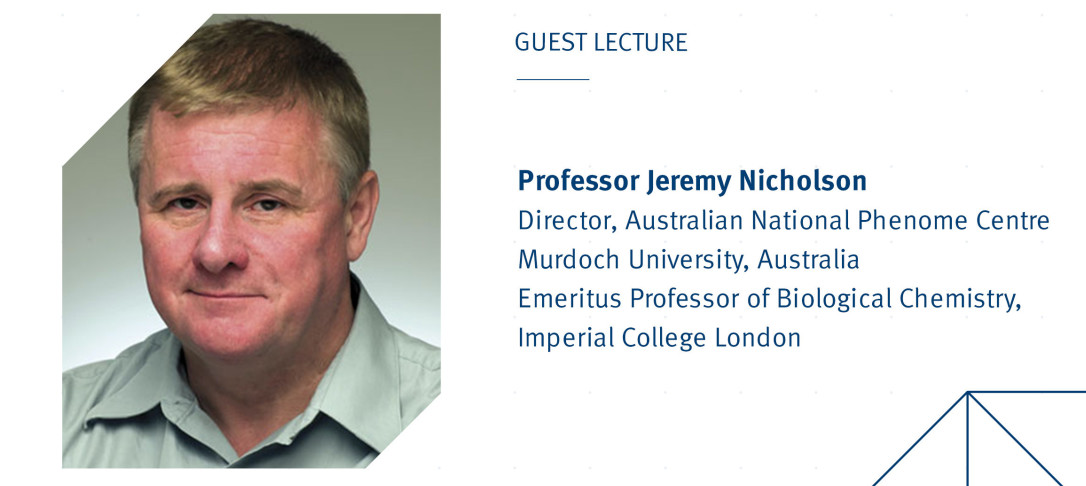
The Institute of Global Health Innovation is delighted to be hosting a guest lecture from Professor Jeremy Nicholson, Director of the Australian National Phenome Centre at Murdoch University, Australia and Emeritus Professor of Biological Chemistry, Imperial College London.
In this lecture, Professor Nicholson will illustrate the integrative use of multiple phenomic technologies for studying the COVID-19 patient journey using collections of samples from multiple populations round the world. He will demonstrate a translational strategy for population level monitoring and assessment of long COVID and functional biochemical recovery from the disease.
Location
The event will be chaired by Professor Mark Thursz, Professor of Hepatology and Head of Department, Faculty of Medicine, Department of Metabolism, Digestion and Reproduction.
The event will be held in-person on campus. The event is open to all.
The lecture will be at Anthony De Rothschild Lecture Theatre, St Mary’s Campus, Paddington. Read instructions for how to get to the building on the day.
Registration for the in-person event is required due to strict limited capacity and places will be offered on a first-come, first-served basis.
About Prof Jeremy Nicholson
Professor Nicholson obtained his PhD in Biochemistry from St Thomas’s Hospital Medical School, London University in 1980. After a series of academic appointments in Pharmacology and Chemistry at Birkbeck College and University College London, he was made full Professor of Chemistry in 1992. He was then appointed as Professor and Head of Biological Chemistry at Imperial College London in 1998. Subsequently Head of the Department of Biomolecular Medicine at Imperial in 1997, then Head of the Department of Surgery and Cancer (2009-2018). In 2012 he became director of the world’s first National Phenome Centre – the MRC-NIHR National Phenome Center at Imperial and is also founder and chair of the International Phenome Centre Network (2016-to date). He became the Pro-Vice Chancellor for Health Sciences at Murdoch University and to direct the new Australian National Phenome Center in Perth, Western Australia in 2019. He has authored over 900 research papers on spectroscopy, informatics, metabolic biochemistry, and systems medicine. His major research focus is on the development of diagnostic and prognostic molecular phenotyping and computational technologies as applied to problems in personalised healthcare, microbiome-host metabolic signalling, metabolic diseases. For the last 2 years he has been leading an international team working on the metabolic sequelae of and long-term complications of COVID-19.
Exploring the Natural History of COVID-19 and Post-Acute COVID-19 Syndrome with Integrated Molecular Phenomics
The COVID-19 pandemic has posed a unique set of intertwined medical and economic problems that have impacted on the lives of hundreds of millions of people. While the virus could cause life threatening respiratory disease, it can also cause major-multi-organ effects through Long COVID or post-acute COVID-19 Syndrome (PACS) which currently affects millions of people worldwide. So, the legacy of COVID-19 even after supposed transitioning from a pandemic to an endemic disease will continue for years requiring the development of new monitoring and mitigation strategies at the population level.
Phenomics is the study of the continuum of gene-environment interactions throughout life and the measurement of the emergent physical and chemical properties that results from these interactions which can then be used to define individual and population phenotypes in health and disease. Molecular phenomics is concerned with the chemical and biochemical signatures (metabolites, proteins, transcripts etc.) of cells and biofluids and how these change in characteristic ways during the onset, development, and recovery from disease. Research has shown that molecular phenomic approaches reveal a great deal of the complexity of the multi-organ impacts caused by COVID-19 and provide new ways for assessing the functional recovery and long-term risks from the disease.
The use of exploratory and targeted metabolic phenotyping linked to immunology is a powerful approach for exploring the journey from the “normal” population physiological state through the acute phase of the disease and into the “long COVID” and “recovery” states from the disease. The immuno-metabolic drivers of Long COVID however are still poorly understood and require new diagnostic, prognostic and predictive tool development.
In this lecture Professor Jeremy Nicholson will illustrate the integrative use of multiple phenomic technologies for studying the COVID-19 patient journey using collections of samples from multiple populations round the world, and demonstrate a translational strategy for population level monitoring and assessment of long COVID and functional biochemical recovery from the disease.